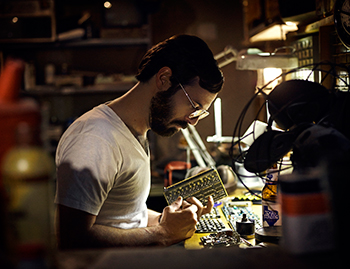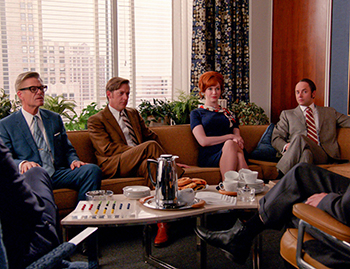AMC Aims to ‘Catch Fire’ With ‘Mad Men’ Promo Tie-in

The smarter way to stay on top of broadcasting and cable industry. Sign up below
You are now subscribed
Your newsletter sign-up was successful
As recappers and tube-o-philes continue to dissect Sunday’s first-half finale of Mad Men, we wanted to take a closer look at a less-discussed element of the broadcast that caught our attention: a novel promo for Halt and Catch Fire (pictured left), which debuts in Mad Men’s timeslot on June 1.
Here are some thoughts from executive editor Dade Hayes and contributing editor Paige Albiniak:
DH: Viewers’ cups runneth over with quality programming these days, so clearly networks have to work harder than ever to get their shows noticed. Not for nothing was “noisy” one of the big buzzwords from the upfronts. But while there is a business imperative, on a creative level AMC appears to be in somewhat uncharted territory with its latest promo spot for Halt and Catch Fire. The promo that started airing recently cuts together moments from the mainframe computer scenes from recent Mad Men episodes to tease the new show’s computer revolution. Peggy shouts, “It’s just a computer!” Ginsberg, as he is wheeled off to the loony bin, cries, “Get out while you still can!” And the voice of God intones, “Once, the future was hard to see. Then three rebels got with the program.” Cut to 1983 and the briefest of peeks at Halt.
I am a longtime admirer of Mad Men and definitely curious to see Halt, regardless of timeslot or network. But I can’t remember another case of actual scenes from a show with this kind of solid-gold pedigree being used so blatantly to sell a freshman series. We didn’t see scenes of The Sopranos’ Paulie Walnuts with the voiceover, “If you liked this guy breakin’ balls, you’ll love Boardwalk Empire.” Or, “If you loved the mosque shootout in Homeland, be sure to watch a show that also featured the shooting of a religious leader … Ray Donovan.” It just seems a little borderline to me. What did you think, Paige?
PA: I loved the crossover promo. I thought it was a really clever use of one of Mad Men’s main themes this year—where is technology taking us and what does it mean for me as a creative?—leading right into the next phase of the tech revolution, which is what Halt and Catch Fire will cover. We’re all living on the digital edge right now, so we can all relate to what these characters are going through. Moreover, I think it’s very interesting to consider these recent events as cultural history, and then look at how that history is currently affecting all of us.
Also, why not use one of your most-acclaimed shows to promote an upcoming one? While I find your fictional examples very amusing, I don’t think this promo was as blatant and tacky as those suggest. I think in a world where it’s very difficult to get people to tune in and pay attention, it makes sense to tell your audience, “Hey, if you like this show, you’ll also like what we’ve got coming.”
That’s increasingly the point of social media and apps that make personalized watch recommendations. People’s time is short; they want someone to curate their content for them. Why shouldn’t that curator be AMC?
The smarter way to stay on top of broadcasting and cable industry. Sign up below
DH: Before I respond to that, let me quote from one of your previous B&C stories just to encourage people to keep reading. I kid, I meta-kid. Seriously, though, I do agree that it makes complete business sense, not knocking that at all. And clearly this is a network that knows how to integrate and innovate – the same commercial pods on May 25 during the half-season finale also featured clips from the show woven together with a spot for Lincoln (“And speaking of surprises …”) Over the years I have enjoyed campaigns for the likes of BMW and Mercedes tailored specifically for the show. In terms of promoting their own wares, you’re right – a tastemaking network like AMC should take advantage of the status of its biggest hits to promote what’s next. Given the way social media and online marketing works and the ubiquity of clips, mash-ups and so forth, the distinction I am drawing is probably less significant than it used to be. Still, for me it’s all about context.

A George Trow quote I’ve always enjoyed seems to apply here—“Television does not vary. The trivial is raised up to power. The powerful is lowered toward the trivial.”
To me the experience of watching Mad Men is so pure and so intense it just seemed jarring to suddenly have clips of it repurposed to plug a show from a different creator, about a different time period and different characters, all “raised up” to a powerful current show. Maybe in a couple weeks’ time the integration will make more sense and for the record I am not calling Halt trivial. I am just trying to think of a TV precedent. Movie studios have been doing similar things for decades with trailers. I wonder what Matthew Weiner, a noted cinephile who has injected a lot of film elements into the show (my bet is that Megan would have hated The Wild Bunch, by the way, but I digress…), made of the spot. I suppose, like Don Draper, he found a path to acceptance, recognizing in the show’s final leg how ephemeral the whole journey tends to be. As Don told Ted Chaough, “you don’t want to see what happens when it’s really gone.”
PA: I think if you want to get all pure about your creative experience, go watch HBO or Netflix or buy the episodes on iTunes. It’s the same for producers—if they want to produce shows without commercial interruptions (and Weiner has certainly argued for that at times), they need to gain the opportunity to produce for premium. Obviously, Weiner didn’t have that chance, because HBO passed on Mad Men, but in this day and age it’s dangerous to get too high and mighty about the creative. As a side note, that’s one of the themes I always enjoy in Mad Men—the constant battle between doing business and being creative and what you must sacrifice in the name of the creative, as Don has well learned over the past couple of seasons. I think a lot of that comes from Weiner’s own journey as a creative person.
In any case, I just thank the TV gods that AMC and Lionsgate had the foresight to green light the pilot even though they had no idea how the business side was going to pan out. I hate to break it to you creatives, but business drives what you do. You can sit in your office and be creative all day long, but if no one is watching, it matters not a lick. And that’s true whether you are producing for NBC or Showtime or FX or Amazon.
That said, I’m heading into deeper waters than a discussion about this promo demands. To me, the blending of the two shows as a quick promotional stunt was clever and creative, while serving a business purpose. It’s funny to me that you brought this up because I really sat up and took notice when the promo aired, finding it such a smart use of the theme. It’s also interesting to me that you found it so jarring while I found it innovative. One of the things I love about TV right now is that not only are producers, writers and actors getting to be as creative as they want to be, so are marketers. Those are people who previously got to peek into the creative, maybe tap dance around the edge of it, but never really got to dive in. Now the high level of shows and the difficulty of cutting through the clutter is demanding an equally high level of work from marketers. Some of it may work, some of it may not, but if it gets you talking—like this has—it absolutely was successful.
Jessika is an analyst for TVREV and Fabric Media. She previously served in various roles at Broadcasting + Cable, Multichannel News and NextTV, working with the brands since 2013. A graduate of USC Annenberg, Jessika has edited and reported on a variety of subjects in the media and entertainment space, including profiles on industry leaders and breaking news.

